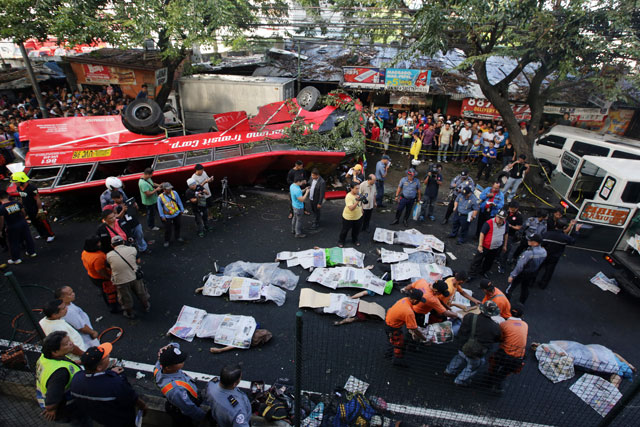SUMMARY
This is AI generated summarization, which may have errors. For context, always refer to the full article.

MANILA, Philippines – Following a bus accident that killed 18 people and injured 16 others, Malacañang on Tuesday, December 17, said the government has taken steps to eventually keep “irresponsible operators and reckless drivers” out of the streets.
Presidential Communications and Operations Office Secretary Sonny Coloma said the administration’s objective is to prevent them “from obtaining government permission to operate unsafe vehicles that place the lives of the riding public at risk.”
The Land Transportation Franchising and Regulatory Board (LTFRB) has slapped a 30-day suspension on the operations of the entire fleet of Don Mariano Transit Corporation, the bus line responsible for Monday’s accident.
Coloma said the government will also closely monitor “compliance by bus operators of occupational health and safety standards” through the Department of Labor and Employment (DOLE) as outlined by law.
“This department order compels bus operators to secure a Labor Standards and Compliance Certificate as a mandatory requirement before they could apply or renew their franchise with the LTFRB,” he said.
Coloma also emphasized Aquino’s coordination with the Japan International Cooperation Agency (JICA) in creating a road map for improved public transportation, as well as to ease traffic congestion in Metro Manila.
“Concrete programs have been proposed by JICA, a longtime partner of the Philippine government in the aspect of improving the quality of public transportation. Other aspects of this are being thoroughly studied in order to bring our people a higher standard of safety in our public transportation system,” he said.
Coloma said the government will continue its integrated approach of enforcement, engineering, and education to ensure road safety.
“There are always 3 aspects we link together: law enforcement, engineering – making sure roads are designed right to avoid accidents – and education, which is to heighten public awareness on the need for road safety,” he said.
On Monday, December 16, a Don Mariano bus skidded off the Skyway and fell onto a van on the road below, killing at least 18. A survivor said the cause of the accident was overspeeding, but investigators are also looking into the quality of the ill-fated vehicle.
Use road users’ tax
Meanwhile, Senator Ralph Recto proposed the “wise utilization” of tax collection from road users worth about P12 billion to ensure road safety.
“Actually, all collections from road user’s tax must be spent for road safety. That’s the end objective. But there’s a provision in the law specifically setting aside 7.5% of what’s collected for road safety,” Recto said in a statement.
He said the Motor Vehicle User’s Charge (MVUC) could be used for roadway improvement and repairs, road safety education and training programs, ambulances in traffic-prone highways, patrol cars to chase overspending vehicles, and seminars teaching drivers to check if their tires are worn-out, among others.
“My point is that the carnage on the streets and the chaos on our roads should prompt a readjustment in MVUC spending. The body controlling it should depart from the traditional ‘signs-asphalt overlay-reflectorized markers’ that once dominated its expenditure list,” Recto said.
A 7-member Road Board chaired by the secretary of public works and highways decides on MVUC spending. The board’s other members include the secretaries of the departments of budget, finance, and transportation and communications, and 3 representatives from the private sector appointed by the President.
Coloma said the administration would continue to find ways to promote road safety, but suggested that, in terms of new laws, it can only do so much. For instance, he said, requiring buses to have tachometers – a speed monitoring and control device – is something for lawmakers to decide on.
“We will just leave our lawmakers to analyze whether it is beneficial or good to make into law to make the results and improvements more permanent,” he said. “Its’ just like the Safety Belt Law, which is now being enforced in public transportations.”
Coloma defended the administration’s efforts in preventing road accidents. He said “concrete steps” have been taken to ensure safety, such as improvements in road design and the strict implementation of speed limits on Commonwealth Avenue, resulting in a decrease in accidents.
Additionally, he said, the government has imposed speed limits in many other roads and installed CCTV cameras. – Rappler.com
Add a comment
How does this make you feel?
There are no comments yet. Add your comment to start the conversation.